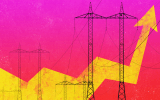


The head of the Reserve Bank of Australia is alert to the conflict in the Middle East adding to other shocks already pushing up the cost of living.
In her first public appearance as governor of Australia’s central bank, Michele Bullock said the bank was concerned about the potential inflation implications of another major conflict.
“Typically, when we think about shocks to supply that increased prices, you think, well, that’s probably ‘OK, it’ll wash out’,” she said at the Australian Financial Security Authority summit in Sydney.
“But the problem is that we’ve just got shock after shock after shock.
“And the more that that keeps inflation elevated, even if it’s from supply shocks, the more people adjust their thinking, and the more people adjust their inflation expectations, the more entrenched inflation is likely to become.”
Ms Bullock said it was unclear how the conflict would affect prices but it had initially pushed up oil prices, which were already elevated and flowing through to higher prices at the petrol pump.
On the other hand, she said the conflict in Ukraine and now the Middle East could slow growth across the globe, which would also be challenging.
“So it’s really a bit of a balancing act.”
The central bank has been on hold for four months in a row but the possibility of another interest rate hike remains live.
In the minutes from the most recent board meeting, the RBA noted that inflation was coming down but warned of risks threatening its plan for bringing prices back within the target band by late 2025.
The minutes said the board has a “low tolerance” for a slower return to target than already forecasted.
The Deloitte Access Economics team said inflation is following a downward trend as the RBA’s interest rate hikes weighed on demand and supply chain pressures resolved.
“And despite some upward pressure on inflation from higher oil prices and the weaker Australian dollar, the RBA’s current tightening cycle should be at an end,” the report says.
Any further interest rate hikes, in Deloitte’s view, are likely to increase the chance of recession.
– AAP










